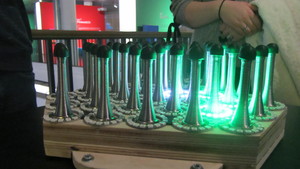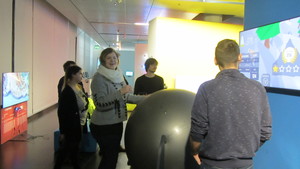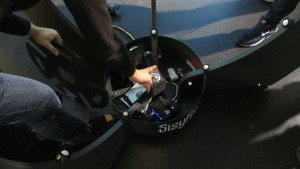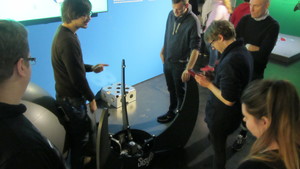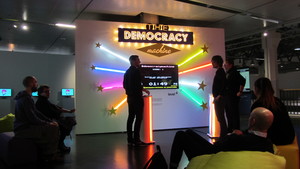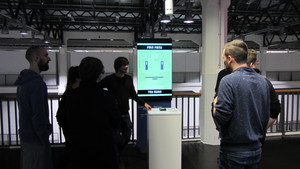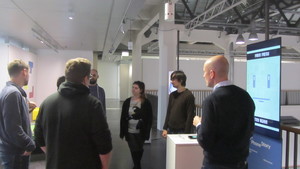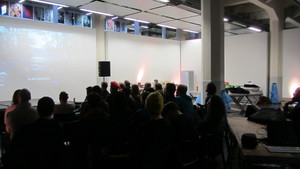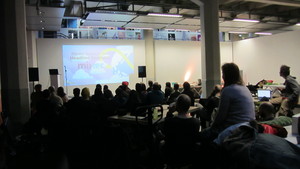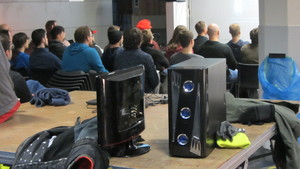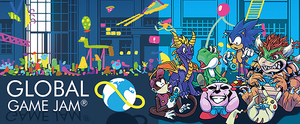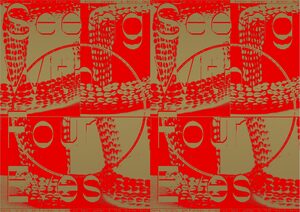"Wintersemester 2018/2019"
| Begriff | Wintersemester 2018/2019 |
| Metakey | Semester (institution:semester) |
| Typ | Keyword |
| Vokabular | HfG |
196 Inhalte
- Seite 1 von 17
Excursion Next Level
- Titel
- Excursion Next Level
- Autor/in
- Beschreibung (de)
- „Present Tense” beschäftigt sich mit unserer unmittelbaren Gegenwart: Wir leben in einer komplexen, krisenhaften Zeit, in der die Überlagerung von Klima- und Energiekrise, Postpandemie, Prekarität und Konkurrenz, gesellschaftlicher Radikalisierung bis hin zu näher rückenden Kriegen bereits jetzt gravierende Auswirkungen auf unser Leben und Arbeiten hat. Die Anspannung steigt, wir stehen vor dringlichen gesamtgesellschaftlichen Aufgaben und bewegen uns zugleich in Richtung eines Zustands chronischer Erschöpfung. Das etablierte Kunstfeld und die künstlerische und kulturelle Produktion sind davon nicht ausgenommen. Mit Künstler:innen, Kurator:innen und anderen Expert:innen des kulturellen Feldes möchten wir den Blick auf die aktuelle künstlerische Produktion und Ausstellungspraxis richten und die Frage nach möglichen (Zukunfts-)perspektiven für das Kunstfeld diskutieren:
Welche gesellschaftliche Rolle können und müssen Kunst und ihre Produzent:innen in einer sich radikal verändernden Welt einnehmen? Wie können Kunst- und Kulturinstitutionen zu Orten aktiver gesellschaftlicher Transformation werden? Was bedeutet es, eine (ökologisch wie sozial) nachhaltige künstlerische und institutionelle Praxis in der digitalen Gegenwart zu entwickeln? Welche neuen Gemeinschaften brauchen wir, gerade im Hinblick auf die zunehmende gesellschaftliche Spaltung und Radikalisierung? Offensichtlich führt die krisenhafte Gegenwart u. a. dazu, dass sich Menschen nach autoritären Figuren und Programmen sehen – eine Aufgabe von Kunst und Kultur könnte es sein, andere, freiere Konzepte von Zukunft zu entwerfen.
Auch das Konzept der Fürsorge in der künstlerischen und kuratorischen Praxis wird Thema der Veranstaltung sein. Teil des Symposiums sind neben Vorträgen künstlerische Workshops, Interventionen und Performances, die wir als gleichwertige Formen der Wissensproduktion und -vermittlung begreifen.
Mit Beiträgen von Gin Bahc, Sascia Bailer, Constanze Fischbeck, Sina Hensel, Alistair Hudson, Anne Duk Hee Jordan, Valentina Karga, Matriarchale Volksküche, Jacob Ott und Dorothee Richter.
- „Present Tense” beschäftigt sich mit unserer unmittelbaren Gegenwart: Wir leben in einer komplexen, krisenhaften Zeit, in der die Überlagerung von Klima- und Energiekrise, Postpandemie, Prekarität und Konkurrenz, gesellschaftlicher Radikalisierung bis hin zu näher rückenden Kriegen bereits jetzt gravierende Auswirkungen auf unser Leben und Arbeiten hat. Die Anspannung steigt, wir stehen vor dringlichen gesamtgesellschaftlichen Aufgaben und bewegen uns zugleich in Richtung eines Zustands chronischer Erschöpfung. Das etablierte Kunstfeld und die künstlerische und kulturelle Produktion sind davon nicht ausgenommen. Mit Künstler:innen, Kurator:innen und anderen Expert:innen des kulturellen Feldes möchten wir den Blick auf die aktuelle künstlerische Produktion und Ausstellungspraxis richten und die Frage nach möglichen (Zukunfts-)perspektiven für das Kunstfeld diskutieren:
- Beschreibung (en)
- „Present Tense” concerns itself with our immediate present: We live in a complex, crisis-filled age in which the overlapping of climate and energy crisis, post-pandemic times, precarity, social radicalisation and even impending wars already govern our lives and work. Tension is rising, we are faced with imperative responsibilities for society as a whole and are, at the same time, moving towards a state of chronic exhaustion. There is no exception for the field of arts and artistic and cultural production.
Together with artists, curators and other experts from the cultural field, we would like to examine current artistic productions and exhibition practices and discuss possibilities for the (future) perspectives of the arts. Which roles within society can and must art and its producers embrace in a radically changing world? How can art and cultural institutions become venues of active social transformation? What does it mean to develop an (ecologically as well as socially) sustainable artistic and institutional practice in the digital present? The concept of care within artistic and curatorial practices will be a topic of the event as well.
What new relationships do we need, especially in view of intensifying social division and radicalisation? Obviously, the crisis-filled present among other things leads to people looking to authoritarian figures and programmes – one of the tasks for art and culture could be to design other, more independent and free concepts of the future.
In addition to lectures and panels, the symposium will include artistic workshops, interventions and performances, which are also forms of knowledge production and dissemination that we feel to be of equal importance.
With contributions from Gin Bahc, Sascia Bailer, Constanze Fischbeck, Sina Hensel, Alistair Hudson, Anne Duk Hee Jordan, Valentina Karga, Matriarchale Volksküche, Jacob Ott and Dorothee Richter
- „Present Tense” concerns itself with our immediate present: We live in a complex, crisis-filled age in which the overlapping of climate and energy crisis, post-pandemic times, precarity, social radicalisation and even impending wars already govern our lives and work. Tension is rising, we are faced with imperative responsibilities for society as a whole and are, at the same time, moving towards a state of chronic exhaustion. There is no exception for the field of arts and artistic and cultural production.
- Typ des Projekts/Werks
- Schlagworte
- Datierung
- 19.02.2019
- Mitwirkende
- Ort: Institution
- Ort
- Lichthof, R.112
- Stadt
- Land
- Beteiligte Institution(en)
- Titel
- Excursion Next Level
- Urheberrechtshinweis
- Víctor Fancelli Capdevila / GameLab / Hochschule für Gestaltung
- Medienersteller/in
- Projektleiter/in
- Semester
- Lehrveranstaltung
- Importiert am
- 14.02.2019
- Übergeordnete Sets
- 1
Excursion Next Level
- Titel
- Excursion Next Level
- Autor/in
- Beschreibung (de)
- „Present Tense” beschäftigt sich mit unserer unmittelbaren Gegenwart: Wir leben in einer komplexen, krisenhaften Zeit, in der die Überlagerung von Klima- und Energiekrise, Postpandemie, Prekarität und Konkurrenz, gesellschaftlicher Radikalisierung bis hin zu näher rückenden Kriegen bereits jetzt gravierende Auswirkungen auf unser Leben und Arbeiten hat. Die Anspannung steigt, wir stehen vor dringlichen gesamtgesellschaftlichen Aufgaben und bewegen uns zugleich in Richtung eines Zustands chronischer Erschöpfung. Das etablierte Kunstfeld und die künstlerische und kulturelle Produktion sind davon nicht ausgenommen. Mit Künstler:innen, Kurator:innen und anderen Expert:innen des kulturellen Feldes möchten wir den Blick auf die aktuelle künstlerische Produktion und Ausstellungspraxis richten und die Frage nach möglichen (Zukunfts-)perspektiven für das Kunstfeld diskutieren:
Welche gesellschaftliche Rolle können und müssen Kunst und ihre Produzent:innen in einer sich radikal verändernden Welt einnehmen? Wie können Kunst- und Kulturinstitutionen zu Orten aktiver gesellschaftlicher Transformation werden? Was bedeutet es, eine (ökologisch wie sozial) nachhaltige künstlerische und institutionelle Praxis in der digitalen Gegenwart zu entwickeln? Welche neuen Gemeinschaften brauchen wir, gerade im Hinblick auf die zunehmende gesellschaftliche Spaltung und Radikalisierung? Offensichtlich führt die krisenhafte Gegenwart u. a. dazu, dass sich Menschen nach autoritären Figuren und Programmen sehen – eine Aufgabe von Kunst und Kultur könnte es sein, andere, freiere Konzepte von Zukunft zu entwerfen.
Auch das Konzept der Fürsorge in der künstlerischen und kuratorischen Praxis wird Thema der Veranstaltung sein. Teil des Symposiums sind neben Vorträgen künstlerische Workshops, Interventionen und Performances, die wir als gleichwertige Formen der Wissensproduktion und -vermittlung begreifen.
Mit Beiträgen von Gin Bahc, Sascia Bailer, Constanze Fischbeck, Sina Hensel, Alistair Hudson, Anne Duk Hee Jordan, Valentina Karga, Matriarchale Volksküche, Jacob Ott und Dorothee Richter.
- „Present Tense” beschäftigt sich mit unserer unmittelbaren Gegenwart: Wir leben in einer komplexen, krisenhaften Zeit, in der die Überlagerung von Klima- und Energiekrise, Postpandemie, Prekarität und Konkurrenz, gesellschaftlicher Radikalisierung bis hin zu näher rückenden Kriegen bereits jetzt gravierende Auswirkungen auf unser Leben und Arbeiten hat. Die Anspannung steigt, wir stehen vor dringlichen gesamtgesellschaftlichen Aufgaben und bewegen uns zugleich in Richtung eines Zustands chronischer Erschöpfung. Das etablierte Kunstfeld und die künstlerische und kulturelle Produktion sind davon nicht ausgenommen. Mit Künstler:innen, Kurator:innen und anderen Expert:innen des kulturellen Feldes möchten wir den Blick auf die aktuelle künstlerische Produktion und Ausstellungspraxis richten und die Frage nach möglichen (Zukunfts-)perspektiven für das Kunstfeld diskutieren:
- Beschreibung (en)
- „Present Tense” concerns itself with our immediate present: We live in a complex, crisis-filled age in which the overlapping of climate and energy crisis, post-pandemic times, precarity, social radicalisation and even impending wars already govern our lives and work. Tension is rising, we are faced with imperative responsibilities for society as a whole and are, at the same time, moving towards a state of chronic exhaustion. There is no exception for the field of arts and artistic and cultural production.
Together with artists, curators and other experts from the cultural field, we would like to examine current artistic productions and exhibition practices and discuss possibilities for the (future) perspectives of the arts. Which roles within society can and must art and its producers embrace in a radically changing world? How can art and cultural institutions become venues of active social transformation? What does it mean to develop an (ecologically as well as socially) sustainable artistic and institutional practice in the digital present? The concept of care within artistic and curatorial practices will be a topic of the event as well.
What new relationships do we need, especially in view of intensifying social division and radicalisation? Obviously, the crisis-filled present among other things leads to people looking to authoritarian figures and programmes – one of the tasks for art and culture could be to design other, more independent and free concepts of the future.
In addition to lectures and panels, the symposium will include artistic workshops, interventions and performances, which are also forms of knowledge production and dissemination that we feel to be of equal importance.
With contributions from Gin Bahc, Sascia Bailer, Constanze Fischbeck, Sina Hensel, Alistair Hudson, Anne Duk Hee Jordan, Valentina Karga, Matriarchale Volksküche, Jacob Ott and Dorothee Richter
- „Present Tense” concerns itself with our immediate present: We live in a complex, crisis-filled age in which the overlapping of climate and energy crisis, post-pandemic times, precarity, social radicalisation and even impending wars already govern our lives and work. Tension is rising, we are faced with imperative responsibilities for society as a whole and are, at the same time, moving towards a state of chronic exhaustion. There is no exception for the field of arts and artistic and cultural production.
- Typ des Projekts/Werks
- Schlagworte
- Datierung
- 19.02.2019
- Mitwirkende
- Ort: Institution
- Ort
- Lichthof, R.112
- Stadt
- Land
- Beteiligte Institution(en)
- Titel
- Excursion Next Level
- Urheberrechtshinweis
- Víctor Fancelli Capdevila / GameLab / Hochschule für Gestaltung
- Medienersteller/in
- Projektleiter/in
- Semester
- Lehrveranstaltung
- Importiert am
- 14.02.2019
- Übergeordnete Sets
- 1
Excursion Next Level
- Titel
- Excursion Next Level
- Autor/in
- Beschreibung (de)
- „Present Tense” beschäftigt sich mit unserer unmittelbaren Gegenwart: Wir leben in einer komplexen, krisenhaften Zeit, in der die Überlagerung von Klima- und Energiekrise, Postpandemie, Prekarität und Konkurrenz, gesellschaftlicher Radikalisierung bis hin zu näher rückenden Kriegen bereits jetzt gravierende Auswirkungen auf unser Leben und Arbeiten hat. Die Anspannung steigt, wir stehen vor dringlichen gesamtgesellschaftlichen Aufgaben und bewegen uns zugleich in Richtung eines Zustands chronischer Erschöpfung. Das etablierte Kunstfeld und die künstlerische und kulturelle Produktion sind davon nicht ausgenommen. Mit Künstler:innen, Kurator:innen und anderen Expert:innen des kulturellen Feldes möchten wir den Blick auf die aktuelle künstlerische Produktion und Ausstellungspraxis richten und die Frage nach möglichen (Zukunfts-)perspektiven für das Kunstfeld diskutieren:
Welche gesellschaftliche Rolle können und müssen Kunst und ihre Produzent:innen in einer sich radikal verändernden Welt einnehmen? Wie können Kunst- und Kulturinstitutionen zu Orten aktiver gesellschaftlicher Transformation werden? Was bedeutet es, eine (ökologisch wie sozial) nachhaltige künstlerische und institutionelle Praxis in der digitalen Gegenwart zu entwickeln? Welche neuen Gemeinschaften brauchen wir, gerade im Hinblick auf die zunehmende gesellschaftliche Spaltung und Radikalisierung? Offensichtlich führt die krisenhafte Gegenwart u. a. dazu, dass sich Menschen nach autoritären Figuren und Programmen sehen – eine Aufgabe von Kunst und Kultur könnte es sein, andere, freiere Konzepte von Zukunft zu entwerfen.
Auch das Konzept der Fürsorge in der künstlerischen und kuratorischen Praxis wird Thema der Veranstaltung sein. Teil des Symposiums sind neben Vorträgen künstlerische Workshops, Interventionen und Performances, die wir als gleichwertige Formen der Wissensproduktion und -vermittlung begreifen.
Mit Beiträgen von Gin Bahc, Sascia Bailer, Constanze Fischbeck, Sina Hensel, Alistair Hudson, Anne Duk Hee Jordan, Valentina Karga, Matriarchale Volksküche, Jacob Ott und Dorothee Richter.
- „Present Tense” beschäftigt sich mit unserer unmittelbaren Gegenwart: Wir leben in einer komplexen, krisenhaften Zeit, in der die Überlagerung von Klima- und Energiekrise, Postpandemie, Prekarität und Konkurrenz, gesellschaftlicher Radikalisierung bis hin zu näher rückenden Kriegen bereits jetzt gravierende Auswirkungen auf unser Leben und Arbeiten hat. Die Anspannung steigt, wir stehen vor dringlichen gesamtgesellschaftlichen Aufgaben und bewegen uns zugleich in Richtung eines Zustands chronischer Erschöpfung. Das etablierte Kunstfeld und die künstlerische und kulturelle Produktion sind davon nicht ausgenommen. Mit Künstler:innen, Kurator:innen und anderen Expert:innen des kulturellen Feldes möchten wir den Blick auf die aktuelle künstlerische Produktion und Ausstellungspraxis richten und die Frage nach möglichen (Zukunfts-)perspektiven für das Kunstfeld diskutieren:
- Beschreibung (en)
- „Present Tense” concerns itself with our immediate present: We live in a complex, crisis-filled age in which the overlapping of climate and energy crisis, post-pandemic times, precarity, social radicalisation and even impending wars already govern our lives and work. Tension is rising, we are faced with imperative responsibilities for society as a whole and are, at the same time, moving towards a state of chronic exhaustion. There is no exception for the field of arts and artistic and cultural production.
Together with artists, curators and other experts from the cultural field, we would like to examine current artistic productions and exhibition practices and discuss possibilities for the (future) perspectives of the arts. Which roles within society can and must art and its producers embrace in a radically changing world? How can art and cultural institutions become venues of active social transformation? What does it mean to develop an (ecologically as well as socially) sustainable artistic and institutional practice in the digital present? The concept of care within artistic and curatorial practices will be a topic of the event as well.
What new relationships do we need, especially in view of intensifying social division and radicalisation? Obviously, the crisis-filled present among other things leads to people looking to authoritarian figures and programmes – one of the tasks for art and culture could be to design other, more independent and free concepts of the future.
In addition to lectures and panels, the symposium will include artistic workshops, interventions and performances, which are also forms of knowledge production and dissemination that we feel to be of equal importance.
With contributions from Gin Bahc, Sascia Bailer, Constanze Fischbeck, Sina Hensel, Alistair Hudson, Anne Duk Hee Jordan, Valentina Karga, Matriarchale Volksküche, Jacob Ott and Dorothee Richter
- „Present Tense” concerns itself with our immediate present: We live in a complex, crisis-filled age in which the overlapping of climate and energy crisis, post-pandemic times, precarity, social radicalisation and even impending wars already govern our lives and work. Tension is rising, we are faced with imperative responsibilities for society as a whole and are, at the same time, moving towards a state of chronic exhaustion. There is no exception for the field of arts and artistic and cultural production.
- Typ des Projekts/Werks
- Schlagworte
- Datierung
- 19.02.2019
- Mitwirkende
- Ort: Institution
- Ort
- Lichthof, R.112
- Stadt
- Land
- Beteiligte Institution(en)
- Titel
- Excursion Next Level
- Urheberrechtshinweis
- Víctor Fancelli Capdevila / GameLab / Hochschule für Gestaltung
- Medienersteller/in
- Projektleiter/in
- Semester
- Lehrveranstaltung
- Importiert am
- 14.02.2019
- Übergeordnete Sets
- 1
Excursion Next Level
- Titel
- Excursion Next Level
- Autor/in
- Beschreibung (de)
- „Present Tense” beschäftigt sich mit unserer unmittelbaren Gegenwart: Wir leben in einer komplexen, krisenhaften Zeit, in der die Überlagerung von Klima- und Energiekrise, Postpandemie, Prekarität und Konkurrenz, gesellschaftlicher Radikalisierung bis hin zu näher rückenden Kriegen bereits jetzt gravierende Auswirkungen auf unser Leben und Arbeiten hat. Die Anspannung steigt, wir stehen vor dringlichen gesamtgesellschaftlichen Aufgaben und bewegen uns zugleich in Richtung eines Zustands chronischer Erschöpfung. Das etablierte Kunstfeld und die künstlerische und kulturelle Produktion sind davon nicht ausgenommen. Mit Künstler:innen, Kurator:innen und anderen Expert:innen des kulturellen Feldes möchten wir den Blick auf die aktuelle künstlerische Produktion und Ausstellungspraxis richten und die Frage nach möglichen (Zukunfts-)perspektiven für das Kunstfeld diskutieren:
Welche gesellschaftliche Rolle können und müssen Kunst und ihre Produzent:innen in einer sich radikal verändernden Welt einnehmen? Wie können Kunst- und Kulturinstitutionen zu Orten aktiver gesellschaftlicher Transformation werden? Was bedeutet es, eine (ökologisch wie sozial) nachhaltige künstlerische und institutionelle Praxis in der digitalen Gegenwart zu entwickeln? Welche neuen Gemeinschaften brauchen wir, gerade im Hinblick auf die zunehmende gesellschaftliche Spaltung und Radikalisierung? Offensichtlich führt die krisenhafte Gegenwart u. a. dazu, dass sich Menschen nach autoritären Figuren und Programmen sehen – eine Aufgabe von Kunst und Kultur könnte es sein, andere, freiere Konzepte von Zukunft zu entwerfen.
Auch das Konzept der Fürsorge in der künstlerischen und kuratorischen Praxis wird Thema der Veranstaltung sein. Teil des Symposiums sind neben Vorträgen künstlerische Workshops, Interventionen und Performances, die wir als gleichwertige Formen der Wissensproduktion und -vermittlung begreifen.
Mit Beiträgen von Gin Bahc, Sascia Bailer, Constanze Fischbeck, Sina Hensel, Alistair Hudson, Anne Duk Hee Jordan, Valentina Karga, Matriarchale Volksküche, Jacob Ott und Dorothee Richter.
- „Present Tense” beschäftigt sich mit unserer unmittelbaren Gegenwart: Wir leben in einer komplexen, krisenhaften Zeit, in der die Überlagerung von Klima- und Energiekrise, Postpandemie, Prekarität und Konkurrenz, gesellschaftlicher Radikalisierung bis hin zu näher rückenden Kriegen bereits jetzt gravierende Auswirkungen auf unser Leben und Arbeiten hat. Die Anspannung steigt, wir stehen vor dringlichen gesamtgesellschaftlichen Aufgaben und bewegen uns zugleich in Richtung eines Zustands chronischer Erschöpfung. Das etablierte Kunstfeld und die künstlerische und kulturelle Produktion sind davon nicht ausgenommen. Mit Künstler:innen, Kurator:innen und anderen Expert:innen des kulturellen Feldes möchten wir den Blick auf die aktuelle künstlerische Produktion und Ausstellungspraxis richten und die Frage nach möglichen (Zukunfts-)perspektiven für das Kunstfeld diskutieren:
- Beschreibung (en)
- „Present Tense” concerns itself with our immediate present: We live in a complex, crisis-filled age in which the overlapping of climate and energy crisis, post-pandemic times, precarity, social radicalisation and even impending wars already govern our lives and work. Tension is rising, we are faced with imperative responsibilities for society as a whole and are, at the same time, moving towards a state of chronic exhaustion. There is no exception for the field of arts and artistic and cultural production.
Together with artists, curators and other experts from the cultural field, we would like to examine current artistic productions and exhibition practices and discuss possibilities for the (future) perspectives of the arts. Which roles within society can and must art and its producers embrace in a radically changing world? How can art and cultural institutions become venues of active social transformation? What does it mean to develop an (ecologically as well as socially) sustainable artistic and institutional practice in the digital present? The concept of care within artistic and curatorial practices will be a topic of the event as well.
What new relationships do we need, especially in view of intensifying social division and radicalisation? Obviously, the crisis-filled present among other things leads to people looking to authoritarian figures and programmes – one of the tasks for art and culture could be to design other, more independent and free concepts of the future.
In addition to lectures and panels, the symposium will include artistic workshops, interventions and performances, which are also forms of knowledge production and dissemination that we feel to be of equal importance.
With contributions from Gin Bahc, Sascia Bailer, Constanze Fischbeck, Sina Hensel, Alistair Hudson, Anne Duk Hee Jordan, Valentina Karga, Matriarchale Volksküche, Jacob Ott and Dorothee Richter
- „Present Tense” concerns itself with our immediate present: We live in a complex, crisis-filled age in which the overlapping of climate and energy crisis, post-pandemic times, precarity, social radicalisation and even impending wars already govern our lives and work. Tension is rising, we are faced with imperative responsibilities for society as a whole and are, at the same time, moving towards a state of chronic exhaustion. There is no exception for the field of arts and artistic and cultural production.
- Typ des Projekts/Werks
- Schlagworte
- Datierung
- 19.02.2019
- Mitwirkende
- Ort: Institution
- Ort
- Lichthof, R.112
- Stadt
- Land
- Beteiligte Institution(en)
- Titel
- Excursion Next Level
- Urheberrechtshinweis
- Víctor Fancelli Capdevila / GameLab / Hochschule für Gestaltung
- Medienersteller/in
- Projektleiter/in
- Semester
- Lehrveranstaltung
- Importiert am
- 14.02.2019
- Übergeordnete Sets
- 1
Excursion Next Level
- Titel
- Excursion Next Level
- Autor/in
- Beschreibung (de)
- „Present Tense” beschäftigt sich mit unserer unmittelbaren Gegenwart: Wir leben in einer komplexen, krisenhaften Zeit, in der die Überlagerung von Klima- und Energiekrise, Postpandemie, Prekarität und Konkurrenz, gesellschaftlicher Radikalisierung bis hin zu näher rückenden Kriegen bereits jetzt gravierende Auswirkungen auf unser Leben und Arbeiten hat. Die Anspannung steigt, wir stehen vor dringlichen gesamtgesellschaftlichen Aufgaben und bewegen uns zugleich in Richtung eines Zustands chronischer Erschöpfung. Das etablierte Kunstfeld und die künstlerische und kulturelle Produktion sind davon nicht ausgenommen. Mit Künstler:innen, Kurator:innen und anderen Expert:innen des kulturellen Feldes möchten wir den Blick auf die aktuelle künstlerische Produktion und Ausstellungspraxis richten und die Frage nach möglichen (Zukunfts-)perspektiven für das Kunstfeld diskutieren:
Welche gesellschaftliche Rolle können und müssen Kunst und ihre Produzent:innen in einer sich radikal verändernden Welt einnehmen? Wie können Kunst- und Kulturinstitutionen zu Orten aktiver gesellschaftlicher Transformation werden? Was bedeutet es, eine (ökologisch wie sozial) nachhaltige künstlerische und institutionelle Praxis in der digitalen Gegenwart zu entwickeln? Welche neuen Gemeinschaften brauchen wir, gerade im Hinblick auf die zunehmende gesellschaftliche Spaltung und Radikalisierung? Offensichtlich führt die krisenhafte Gegenwart u. a. dazu, dass sich Menschen nach autoritären Figuren und Programmen sehen – eine Aufgabe von Kunst und Kultur könnte es sein, andere, freiere Konzepte von Zukunft zu entwerfen.
Auch das Konzept der Fürsorge in der künstlerischen und kuratorischen Praxis wird Thema der Veranstaltung sein. Teil des Symposiums sind neben Vorträgen künstlerische Workshops, Interventionen und Performances, die wir als gleichwertige Formen der Wissensproduktion und -vermittlung begreifen.
Mit Beiträgen von Gin Bahc, Sascia Bailer, Constanze Fischbeck, Sina Hensel, Alistair Hudson, Anne Duk Hee Jordan, Valentina Karga, Matriarchale Volksküche, Jacob Ott und Dorothee Richter.
- „Present Tense” beschäftigt sich mit unserer unmittelbaren Gegenwart: Wir leben in einer komplexen, krisenhaften Zeit, in der die Überlagerung von Klima- und Energiekrise, Postpandemie, Prekarität und Konkurrenz, gesellschaftlicher Radikalisierung bis hin zu näher rückenden Kriegen bereits jetzt gravierende Auswirkungen auf unser Leben und Arbeiten hat. Die Anspannung steigt, wir stehen vor dringlichen gesamtgesellschaftlichen Aufgaben und bewegen uns zugleich in Richtung eines Zustands chronischer Erschöpfung. Das etablierte Kunstfeld und die künstlerische und kulturelle Produktion sind davon nicht ausgenommen. Mit Künstler:innen, Kurator:innen und anderen Expert:innen des kulturellen Feldes möchten wir den Blick auf die aktuelle künstlerische Produktion und Ausstellungspraxis richten und die Frage nach möglichen (Zukunfts-)perspektiven für das Kunstfeld diskutieren:
- Beschreibung (en)
- „Present Tense” concerns itself with our immediate present: We live in a complex, crisis-filled age in which the overlapping of climate and energy crisis, post-pandemic times, precarity, social radicalisation and even impending wars already govern our lives and work. Tension is rising, we are faced with imperative responsibilities for society as a whole and are, at the same time, moving towards a state of chronic exhaustion. There is no exception for the field of arts and artistic and cultural production.
Together with artists, curators and other experts from the cultural field, we would like to examine current artistic productions and exhibition practices and discuss possibilities for the (future) perspectives of the arts. Which roles within society can and must art and its producers embrace in a radically changing world? How can art and cultural institutions become venues of active social transformation? What does it mean to develop an (ecologically as well as socially) sustainable artistic and institutional practice in the digital present? The concept of care within artistic and curatorial practices will be a topic of the event as well.
What new relationships do we need, especially in view of intensifying social division and radicalisation? Obviously, the crisis-filled present among other things leads to people looking to authoritarian figures and programmes – one of the tasks for art and culture could be to design other, more independent and free concepts of the future.
In addition to lectures and panels, the symposium will include artistic workshops, interventions and performances, which are also forms of knowledge production and dissemination that we feel to be of equal importance.
With contributions from Gin Bahc, Sascia Bailer, Constanze Fischbeck, Sina Hensel, Alistair Hudson, Anne Duk Hee Jordan, Valentina Karga, Matriarchale Volksküche, Jacob Ott and Dorothee Richter
- „Present Tense” concerns itself with our immediate present: We live in a complex, crisis-filled age in which the overlapping of climate and energy crisis, post-pandemic times, precarity, social radicalisation and even impending wars already govern our lives and work. Tension is rising, we are faced with imperative responsibilities for society as a whole and are, at the same time, moving towards a state of chronic exhaustion. There is no exception for the field of arts and artistic and cultural production.
- Typ des Projekts/Werks
- Schlagworte
- Datierung
- 19.02.2019
- Mitwirkende
- Ort: Institution
- Ort
- Lichthof, R.112
- Stadt
- Land
- Beteiligte Institution(en)
- Titel
- Excursion Next Level
- Urheberrechtshinweis
- Víctor Fancelli Capdevila / GameLab / Hochschule für Gestaltung
- Medienersteller/in
- Projektleiter/in
- Semester
- Lehrveranstaltung
- Importiert am
- 14.02.2019
- Übergeordnete Sets
- 1
Excursion Next Level
- Titel
- Excursion Next Level
- Autor/in
- Beschreibung (de)
- „Present Tense” beschäftigt sich mit unserer unmittelbaren Gegenwart: Wir leben in einer komplexen, krisenhaften Zeit, in der die Überlagerung von Klima- und Energiekrise, Postpandemie, Prekarität und Konkurrenz, gesellschaftlicher Radikalisierung bis hin zu näher rückenden Kriegen bereits jetzt gravierende Auswirkungen auf unser Leben und Arbeiten hat. Die Anspannung steigt, wir stehen vor dringlichen gesamtgesellschaftlichen Aufgaben und bewegen uns zugleich in Richtung eines Zustands chronischer Erschöpfung. Das etablierte Kunstfeld und die künstlerische und kulturelle Produktion sind davon nicht ausgenommen. Mit Künstler:innen, Kurator:innen und anderen Expert:innen des kulturellen Feldes möchten wir den Blick auf die aktuelle künstlerische Produktion und Ausstellungspraxis richten und die Frage nach möglichen (Zukunfts-)perspektiven für das Kunstfeld diskutieren:
Welche gesellschaftliche Rolle können und müssen Kunst und ihre Produzent:innen in einer sich radikal verändernden Welt einnehmen? Wie können Kunst- und Kulturinstitutionen zu Orten aktiver gesellschaftlicher Transformation werden? Was bedeutet es, eine (ökologisch wie sozial) nachhaltige künstlerische und institutionelle Praxis in der digitalen Gegenwart zu entwickeln? Welche neuen Gemeinschaften brauchen wir, gerade im Hinblick auf die zunehmende gesellschaftliche Spaltung und Radikalisierung? Offensichtlich führt die krisenhafte Gegenwart u. a. dazu, dass sich Menschen nach autoritären Figuren und Programmen sehen – eine Aufgabe von Kunst und Kultur könnte es sein, andere, freiere Konzepte von Zukunft zu entwerfen.
Auch das Konzept der Fürsorge in der künstlerischen und kuratorischen Praxis wird Thema der Veranstaltung sein. Teil des Symposiums sind neben Vorträgen künstlerische Workshops, Interventionen und Performances, die wir als gleichwertige Formen der Wissensproduktion und -vermittlung begreifen.
Mit Beiträgen von Gin Bahc, Sascia Bailer, Constanze Fischbeck, Sina Hensel, Alistair Hudson, Anne Duk Hee Jordan, Valentina Karga, Matriarchale Volksküche, Jacob Ott und Dorothee Richter.
- „Present Tense” beschäftigt sich mit unserer unmittelbaren Gegenwart: Wir leben in einer komplexen, krisenhaften Zeit, in der die Überlagerung von Klima- und Energiekrise, Postpandemie, Prekarität und Konkurrenz, gesellschaftlicher Radikalisierung bis hin zu näher rückenden Kriegen bereits jetzt gravierende Auswirkungen auf unser Leben und Arbeiten hat. Die Anspannung steigt, wir stehen vor dringlichen gesamtgesellschaftlichen Aufgaben und bewegen uns zugleich in Richtung eines Zustands chronischer Erschöpfung. Das etablierte Kunstfeld und die künstlerische und kulturelle Produktion sind davon nicht ausgenommen. Mit Künstler:innen, Kurator:innen und anderen Expert:innen des kulturellen Feldes möchten wir den Blick auf die aktuelle künstlerische Produktion und Ausstellungspraxis richten und die Frage nach möglichen (Zukunfts-)perspektiven für das Kunstfeld diskutieren:
- Beschreibung (en)
- „Present Tense” concerns itself with our immediate present: We live in a complex, crisis-filled age in which the overlapping of climate and energy crisis, post-pandemic times, precarity, social radicalisation and even impending wars already govern our lives and work. Tension is rising, we are faced with imperative responsibilities for society as a whole and are, at the same time, moving towards a state of chronic exhaustion. There is no exception for the field of arts and artistic and cultural production.
Together with artists, curators and other experts from the cultural field, we would like to examine current artistic productions and exhibition practices and discuss possibilities for the (future) perspectives of the arts. Which roles within society can and must art and its producers embrace in a radically changing world? How can art and cultural institutions become venues of active social transformation? What does it mean to develop an (ecologically as well as socially) sustainable artistic and institutional practice in the digital present? The concept of care within artistic and curatorial practices will be a topic of the event as well.
What new relationships do we need, especially in view of intensifying social division and radicalisation? Obviously, the crisis-filled present among other things leads to people looking to authoritarian figures and programmes – one of the tasks for art and culture could be to design other, more independent and free concepts of the future.
In addition to lectures and panels, the symposium will include artistic workshops, interventions and performances, which are also forms of knowledge production and dissemination that we feel to be of equal importance.
With contributions from Gin Bahc, Sascia Bailer, Constanze Fischbeck, Sina Hensel, Alistair Hudson, Anne Duk Hee Jordan, Valentina Karga, Matriarchale Volksküche, Jacob Ott and Dorothee Richter
- „Present Tense” concerns itself with our immediate present: We live in a complex, crisis-filled age in which the overlapping of climate and energy crisis, post-pandemic times, precarity, social radicalisation and even impending wars already govern our lives and work. Tension is rising, we are faced with imperative responsibilities for society as a whole and are, at the same time, moving towards a state of chronic exhaustion. There is no exception for the field of arts and artistic and cultural production.
- Typ des Projekts/Werks
- Schlagworte
- Datierung
- 19.02.2019
- Mitwirkende
- Ort: Institution
- Ort
- Lichthof, R.112
- Stadt
- Land
- Beteiligte Institution(en)
- Titel
- Excursion Next Level
- Urheberrechtshinweis
- Víctor Fancelli Capdevila / GameLab / Hochschule für Gestaltung
- Medienersteller/in
- Projektleiter/in
- Semester
- Lehrveranstaltung
- Importiert am
- 14.02.2019
- Übergeordnete Sets
- 1
Excursion Next Level
- Titel
- Excursion Next Level
- Autor/in
- Beschreibung (de)
- „Present Tense” beschäftigt sich mit unserer unmittelbaren Gegenwart: Wir leben in einer komplexen, krisenhaften Zeit, in der die Überlagerung von Klima- und Energiekrise, Postpandemie, Prekarität und Konkurrenz, gesellschaftlicher Radikalisierung bis hin zu näher rückenden Kriegen bereits jetzt gravierende Auswirkungen auf unser Leben und Arbeiten hat. Die Anspannung steigt, wir stehen vor dringlichen gesamtgesellschaftlichen Aufgaben und bewegen uns zugleich in Richtung eines Zustands chronischer Erschöpfung. Das etablierte Kunstfeld und die künstlerische und kulturelle Produktion sind davon nicht ausgenommen. Mit Künstler:innen, Kurator:innen und anderen Expert:innen des kulturellen Feldes möchten wir den Blick auf die aktuelle künstlerische Produktion und Ausstellungspraxis richten und die Frage nach möglichen (Zukunfts-)perspektiven für das Kunstfeld diskutieren:
Welche gesellschaftliche Rolle können und müssen Kunst und ihre Produzent:innen in einer sich radikal verändernden Welt einnehmen? Wie können Kunst- und Kulturinstitutionen zu Orten aktiver gesellschaftlicher Transformation werden? Was bedeutet es, eine (ökologisch wie sozial) nachhaltige künstlerische und institutionelle Praxis in der digitalen Gegenwart zu entwickeln? Welche neuen Gemeinschaften brauchen wir, gerade im Hinblick auf die zunehmende gesellschaftliche Spaltung und Radikalisierung? Offensichtlich führt die krisenhafte Gegenwart u. a. dazu, dass sich Menschen nach autoritären Figuren und Programmen sehen – eine Aufgabe von Kunst und Kultur könnte es sein, andere, freiere Konzepte von Zukunft zu entwerfen.
Auch das Konzept der Fürsorge in der künstlerischen und kuratorischen Praxis wird Thema der Veranstaltung sein. Teil des Symposiums sind neben Vorträgen künstlerische Workshops, Interventionen und Performances, die wir als gleichwertige Formen der Wissensproduktion und -vermittlung begreifen.
Mit Beiträgen von Gin Bahc, Sascia Bailer, Constanze Fischbeck, Sina Hensel, Alistair Hudson, Anne Duk Hee Jordan, Valentina Karga, Matriarchale Volksküche, Jacob Ott und Dorothee Richter.
- „Present Tense” beschäftigt sich mit unserer unmittelbaren Gegenwart: Wir leben in einer komplexen, krisenhaften Zeit, in der die Überlagerung von Klima- und Energiekrise, Postpandemie, Prekarität und Konkurrenz, gesellschaftlicher Radikalisierung bis hin zu näher rückenden Kriegen bereits jetzt gravierende Auswirkungen auf unser Leben und Arbeiten hat. Die Anspannung steigt, wir stehen vor dringlichen gesamtgesellschaftlichen Aufgaben und bewegen uns zugleich in Richtung eines Zustands chronischer Erschöpfung. Das etablierte Kunstfeld und die künstlerische und kulturelle Produktion sind davon nicht ausgenommen. Mit Künstler:innen, Kurator:innen und anderen Expert:innen des kulturellen Feldes möchten wir den Blick auf die aktuelle künstlerische Produktion und Ausstellungspraxis richten und die Frage nach möglichen (Zukunfts-)perspektiven für das Kunstfeld diskutieren:
- Beschreibung (en)
- „Present Tense” concerns itself with our immediate present: We live in a complex, crisis-filled age in which the overlapping of climate and energy crisis, post-pandemic times, precarity, social radicalisation and even impending wars already govern our lives and work. Tension is rising, we are faced with imperative responsibilities for society as a whole and are, at the same time, moving towards a state of chronic exhaustion. There is no exception for the field of arts and artistic and cultural production.
Together with artists, curators and other experts from the cultural field, we would like to examine current artistic productions and exhibition practices and discuss possibilities for the (future) perspectives of the arts. Which roles within society can and must art and its producers embrace in a radically changing world? How can art and cultural institutions become venues of active social transformation? What does it mean to develop an (ecologically as well as socially) sustainable artistic and institutional practice in the digital present? The concept of care within artistic and curatorial practices will be a topic of the event as well.
What new relationships do we need, especially in view of intensifying social division and radicalisation? Obviously, the crisis-filled present among other things leads to people looking to authoritarian figures and programmes – one of the tasks for art and culture could be to design other, more independent and free concepts of the future.
In addition to lectures and panels, the symposium will include artistic workshops, interventions and performances, which are also forms of knowledge production and dissemination that we feel to be of equal importance.
With contributions from Gin Bahc, Sascia Bailer, Constanze Fischbeck, Sina Hensel, Alistair Hudson, Anne Duk Hee Jordan, Valentina Karga, Matriarchale Volksküche, Jacob Ott and Dorothee Richter
- „Present Tense” concerns itself with our immediate present: We live in a complex, crisis-filled age in which the overlapping of climate and energy crisis, post-pandemic times, precarity, social radicalisation and even impending wars already govern our lives and work. Tension is rising, we are faced with imperative responsibilities for society as a whole and are, at the same time, moving towards a state of chronic exhaustion. There is no exception for the field of arts and artistic and cultural production.
- Typ des Projekts/Werks
- Schlagworte
- Datierung
- 19.02.2019
- Mitwirkende
- Ort: Institution
- Ort
- Lichthof, R.112
- Stadt
- Land
- Beteiligte Institution(en)
- Titel
- Excursion Next Level
- Urheberrechtshinweis
- Víctor Fancelli Capdevila / GameLab / Hochschule für Gestaltung
- Medienersteller/in
- Projektleiter/in
- Semester
- Lehrveranstaltung
- Importiert am
- 14.02.2019
- Übergeordnete Sets
- 1
GameJam 2019
- Titel
- GameJam 2019
- Titel (en)
- Game Jam 2019
- Autor/in
- Beschreibung (de)
- Der Global Game Jam (GGJ) ist das weltweit größte Game Jam-Event – eine Art Hackathon, der sich auf die Entwicklung von Spielen konzentriert und an zahlreichen Orten auf der ganzen Welt stattfindet.
Im Jahr 2019 wird zum siebten Mal eine eigene Jam Site an der HfG Karlsruhe eingerichtet. Erfahrene (professionelle) Game Designer treffen auf Nachwuchsentwickler: Alle sind willkommen.
Bis zu 50 Personen sind eingeladen mitzujammen und Teil der weltweiten Entwickler-Community zu werden. Innerhalb von nur 48 Stunden entstehen neue, einzigartige Computerspiele zu einem vorgegebenen Thema. Die Veranstaltung begrüßt internationale Gäste an der HfG Karlsruhe. Die Teilnahme ist kostenlos.
Die Ergebnisse – spielbare Computerspiele zu einem bestimmten Thema – werden am Sonntag, den 27.1. um 17 Uhr allen präsentiert. Die Präsentation zeigt alle Games, die während der 48 Stunden Jam an der HfG Karlsruhe entstanden sind. Interessierte Gäste sind herzlich willkommen, die Games des Global Game Jam kennenzulernen. Die Vorstellung ist natürlich für alle öffentlich und selbstverständlich kostenlos.
Der Global Game Jam ist eine Kooperation der Staatlichen Hochschule für Gestaltung Karlsruhe und des ZKM | Zentrum für Kunst und Medientechnologie in Karlsruhe und wird unterstützt durch das K3 Kultur- und Kreativwirtschaftsbüro Karlsruhe.
Mehr Infos und Anmeldung:
globalgamejam.org
Zur Anmeldung muss man sich unter globalgamejam.org registrieren und dann die HfG Karlsruhe als Location auswählen.
Website des GameLab der HfG:
hfg-karlsruhe.de/gamelab
- Der Global Game Jam (GGJ) ist das weltweit größte Game Jam-Event – eine Art Hackathon, der sich auf die Entwicklung von Spielen konzentriert und an zahlreichen Orten auf der ganzen Welt stattfindet.
- Beschreibung (en)
- The Global Game Jam (GGJ) is the world's largest game jam event (game creation) taking place around the world at physical locations. Think of it as a hackathon focused on game development.
In 2019, a jam site will be set up for the seventh time at the HfG Karlsruhe. Experienced (professional) game designers meet up-and-coming developers: everyone is welcome. Up to 50 people are invited to join in and become part of the global developer community. Within just 48 hours, new, unique computer games are created on a specific topic. The event welcomes international guests at the HfG Karlsruhe. Participation is free.
The results – playable computer games on a specific topic – are presented the world on Sunday. The presentation shows all the games that were created during the 48-hour jam at the HfG Karlsruhe. Interested guests are welcome to meet the games of the Global Game Jam. The presentation is public for all – and of course free of charge.
The Global Game Jam is a cooperation of the Karlsruhe University of Arts and Design and the ZKM | Center for Art and Media in Karlsruhe and is supported by the K3 Kultur- und Kreativwirtschaftsbüro Karlsruhe.
More information and registration: [globalgamejam.org] (http://globalgamejam.org/) You have to register at [globalgamejam.org] (http://globalgamejam.org/) and then select the HfG Karlsruhe as location.
Website of the GameLab of the HfG: hfg-karlsruhe.de/gamelab
- The Global Game Jam (GGJ) is the world's largest game jam event (game creation) taking place around the world at physical locations. Think of it as a hackathon focused on game development.
- Kategorie
- Typ des Projekts/Werks
- Schlagworte
- Datierung
- 25.01.2019 - 27.01.2019
- Mitwirkende
- Ort: Institution
- Ort
- Lichthof, R.112
- Stadt
- Land
- Beteiligte Institution(en)
- Internetlinks
- Titel
- GameJam 2019
- Titel (en)
- GameJam 2019
- Urheberrechtshinweis
- © Staatliche Hochschule für Gestaltung Karlsruhe
- Rechtsschutz/Lizenz
- Medienersteller/in
- Beziehung/Funktion
- Semester
- Importiert am
- 14.02.2019
- Übergeordnete Sets
- 1
GameJam 2019
- Titel
- GameJam 2019
- Titel (en)
- Game Jam 2019
- Autor/in
- Beschreibung (de)
- Der Global Game Jam (GGJ) ist das weltweit größte Game Jam-Event – eine Art Hackathon, der sich auf die Entwicklung von Spielen konzentriert und an zahlreichen Orten auf der ganzen Welt stattfindet.
Im Jahr 2019 wird zum siebten Mal eine eigene Jam Site an der HfG Karlsruhe eingerichtet. Erfahrene (professionelle) Game Designer treffen auf Nachwuchsentwickler: Alle sind willkommen.
Bis zu 50 Personen sind eingeladen mitzujammen und Teil der weltweiten Entwickler-Community zu werden. Innerhalb von nur 48 Stunden entstehen neue, einzigartige Computerspiele zu einem vorgegebenen Thema. Die Veranstaltung begrüßt internationale Gäste an der HfG Karlsruhe. Die Teilnahme ist kostenlos.
Die Ergebnisse – spielbare Computerspiele zu einem bestimmten Thema – werden am Sonntag, den 27.1. um 17 Uhr allen präsentiert. Die Präsentation zeigt alle Games, die während der 48 Stunden Jam an der HfG Karlsruhe entstanden sind. Interessierte Gäste sind herzlich willkommen, die Games des Global Game Jam kennenzulernen. Die Vorstellung ist natürlich für alle öffentlich und selbstverständlich kostenlos.
Der Global Game Jam ist eine Kooperation der Staatlichen Hochschule für Gestaltung Karlsruhe und des ZKM | Zentrum für Kunst und Medientechnologie in Karlsruhe und wird unterstützt durch das K3 Kultur- und Kreativwirtschaftsbüro Karlsruhe.
Mehr Infos und Anmeldung:
globalgamejam.org
Zur Anmeldung muss man sich unter globalgamejam.org registrieren und dann die HfG Karlsruhe als Location auswählen.
Website des GameLab der HfG:
hfg-karlsruhe.de/gamelab
- Der Global Game Jam (GGJ) ist das weltweit größte Game Jam-Event – eine Art Hackathon, der sich auf die Entwicklung von Spielen konzentriert und an zahlreichen Orten auf der ganzen Welt stattfindet.
- Beschreibung (en)
- The Global Game Jam (GGJ) is the world's largest game jam event (game creation) taking place around the world at physical locations. Think of it as a hackathon focused on game development.
In 2019, a jam site will be set up for the seventh time at the HfG Karlsruhe. Experienced (professional) game designers meet up-and-coming developers: everyone is welcome. Up to 50 people are invited to join in and become part of the global developer community. Within just 48 hours, new, unique computer games are created on a specific topic. The event welcomes international guests at the HfG Karlsruhe. Participation is free.
The results – playable computer games on a specific topic – are presented the world on Sunday. The presentation shows all the games that were created during the 48-hour jam at the HfG Karlsruhe. Interested guests are welcome to meet the games of the Global Game Jam. The presentation is public for all – and of course free of charge.
The Global Game Jam is a cooperation of the Karlsruhe University of Arts and Design and the ZKM | Center for Art and Media in Karlsruhe and is supported by the K3 Kultur- und Kreativwirtschaftsbüro Karlsruhe.
More information and registration: [globalgamejam.org] (http://globalgamejam.org/) You have to register at [globalgamejam.org] (http://globalgamejam.org/) and then select the HfG Karlsruhe as location.
Website of the GameLab of the HfG: hfg-karlsruhe.de/gamelab
- The Global Game Jam (GGJ) is the world's largest game jam event (game creation) taking place around the world at physical locations. Think of it as a hackathon focused on game development.
- Kategorie
- Typ des Projekts/Werks
- Schlagworte
- Datierung
- 25.01.2019 - 27.01.2019
- Mitwirkende
- Ort: Institution
- Ort
- Lichthof, R.112
- Stadt
- Land
- Beteiligte Institution(en)
- Internetlinks
- Titel
- GameJam 2019
- Titel (en)
- GameJam 2019
- Urheberrechtshinweis
- © Staatliche Hochschule für Gestaltung Karlsruhe
- Rechtsschutz/Lizenz
- Medienersteller/in
- Beziehung/Funktion
- Semester
- Importiert am
- 14.02.2019
- Übergeordnete Sets
- 1
GameJam 2019
- Titel
- GameJam 2019
- Titel (en)
- Game Jam 2019
- Autor/in
- Beschreibung (de)
- Der Global Game Jam (GGJ) ist das weltweit größte Game Jam-Event – eine Art Hackathon, der sich auf die Entwicklung von Spielen konzentriert und an zahlreichen Orten auf der ganzen Welt stattfindet.
Im Jahr 2019 wird zum siebten Mal eine eigene Jam Site an der HfG Karlsruhe eingerichtet. Erfahrene (professionelle) Game Designer treffen auf Nachwuchsentwickler: Alle sind willkommen.
Bis zu 50 Personen sind eingeladen mitzujammen und Teil der weltweiten Entwickler-Community zu werden. Innerhalb von nur 48 Stunden entstehen neue, einzigartige Computerspiele zu einem vorgegebenen Thema. Die Veranstaltung begrüßt internationale Gäste an der HfG Karlsruhe. Die Teilnahme ist kostenlos.
Die Ergebnisse – spielbare Computerspiele zu einem bestimmten Thema – werden am Sonntag, den 27.1. um 17 Uhr allen präsentiert. Die Präsentation zeigt alle Games, die während der 48 Stunden Jam an der HfG Karlsruhe entstanden sind. Interessierte Gäste sind herzlich willkommen, die Games des Global Game Jam kennenzulernen. Die Vorstellung ist natürlich für alle öffentlich und selbstverständlich kostenlos.
Der Global Game Jam ist eine Kooperation der Staatlichen Hochschule für Gestaltung Karlsruhe und des ZKM | Zentrum für Kunst und Medientechnologie in Karlsruhe und wird unterstützt durch das K3 Kultur- und Kreativwirtschaftsbüro Karlsruhe.
Mehr Infos und Anmeldung:
globalgamejam.org
Zur Anmeldung muss man sich unter globalgamejam.org registrieren und dann die HfG Karlsruhe als Location auswählen.
Website des GameLab der HfG:
hfg-karlsruhe.de/gamelab
- Der Global Game Jam (GGJ) ist das weltweit größte Game Jam-Event – eine Art Hackathon, der sich auf die Entwicklung von Spielen konzentriert und an zahlreichen Orten auf der ganzen Welt stattfindet.
- Beschreibung (en)
- The Global Game Jam (GGJ) is the world's largest game jam event (game creation) taking place around the world at physical locations. Think of it as a hackathon focused on game development.
In 2019, a jam site will be set up for the seventh time at the HfG Karlsruhe. Experienced (professional) game designers meet up-and-coming developers: everyone is welcome. Up to 50 people are invited to join in and become part of the global developer community. Within just 48 hours, new, unique computer games are created on a specific topic. The event welcomes international guests at the HfG Karlsruhe. Participation is free.
The results – playable computer games on a specific topic – are presented the world on Sunday. The presentation shows all the games that were created during the 48-hour jam at the HfG Karlsruhe. Interested guests are welcome to meet the games of the Global Game Jam. The presentation is public for all – and of course free of charge.
The Global Game Jam is a cooperation of the Karlsruhe University of Arts and Design and the ZKM | Center for Art and Media in Karlsruhe and is supported by the K3 Kultur- und Kreativwirtschaftsbüro Karlsruhe.
More information and registration: [globalgamejam.org] (http://globalgamejam.org/) You have to register at [globalgamejam.org] (http://globalgamejam.org/) and then select the HfG Karlsruhe as location.
Website of the GameLab of the HfG: hfg-karlsruhe.de/gamelab
- The Global Game Jam (GGJ) is the world's largest game jam event (game creation) taking place around the world at physical locations. Think of it as a hackathon focused on game development.
- Kategorie
- Typ des Projekts/Werks
- Schlagworte
- Datierung
- 25.01.2019 - 27.01.2019
- Mitwirkende
- Ort: Institution
- Ort
- Lichthof, R.112
- Stadt
- Land
- Beteiligte Institution(en)
- Internetlinks
- Titel
- GameJam 2019
- Titel (en)
- GameJam 2019
- Urheberrechtshinweis
- © Staatliche Hochschule für Gestaltung Karlsruhe
- Rechtsschutz/Lizenz
- Medienersteller/in
- Beziehung/Funktion
- Semester
- Importiert am
- 14.02.2019
- Übergeordnete Sets
- 1
GameJam 2019
- Titel
- GameJam 2019
- Autor/in
- Beschreibung (de)
- Der Global Game Jam (GGJ) ist das weltweit größte Game Jam-Event – eine Art Hackathon, der sich auf die Entwicklung von Spielen konzentriert und an zahlreichen Orten auf der ganzen Welt stattfindet.
Im Jahr 2019 wird zum siebten Mal eine eigene Jam Site an der HfG Karlsruhe eingerichtet. Erfahrene (professionelle) Game Designer treffen auf Nachwuchsentwickler: Alle sind willkommen.
Bis zu 50 Personen sind eingeladen mitzujammen und Teil der weltweiten Entwickler-Community zu werden. Innerhalb von nur 48 Stunden entstehen neue, einzigartige Computerspiele zu einem vorgegebenen Thema. Die Veranstaltung begrüßt internationale Gäste an der HfG Karlsruhe. Die Teilnahme ist kostenlos.
Die Ergebnisse – spielbare Computerspiele zu einem bestimmten Thema – werden am Sonntag, den 27.1. um 17 Uhr allen präsentiert. Die Präsentation zeigt alle Games, die während der 48 Stunden Jam an der HfG Karlsruhe entstanden sind. Interessierte Gäste sind herzlich willkommen, die Games des Global Game Jam kennenzulernen. Die Vorstellung ist natürlich für alle öffentlich und selbstverständlich kostenlos.
Der Global Game Jam ist eine Kooperation der Staatlichen Hochschule für Gestaltung Karlsruhe und des ZKM | Zentrum für Kunst und Medientechnologie in Karlsruhe und wird unterstützt durch das K3 Kultur- und Kreativwirtschaftsbüro Karlsruhe.
Mehr Infos und Anmeldung:
globalgamejam.org
Zur Anmeldung muss man sich unter globalgamejam.org registrieren und dann die HfG Karlsruhe als Location auswählen.
Website des GameLab der HfG:
hfg-karlsruhe.de/gamelab
- Der Global Game Jam (GGJ) ist das weltweit größte Game Jam-Event – eine Art Hackathon, der sich auf die Entwicklung von Spielen konzentriert und an zahlreichen Orten auf der ganzen Welt stattfindet.
- Beschreibung (en)
- The Global Game Jam (GGJ) is the world's largest game jam event (game creation) taking place around the world at physical locations. Think of it as a hackathon focused on game development.
In 2019, a jam site will be set up for the seventh time at the HfG Karlsruhe. Experienced (professional) game designers meet up-and-coming developers: everyone is welcome. Up to 50 people are invited to join in and become part of the global developer community. Within just 48 hours, new, unique computer games are created on a specific topic. The event welcomes international guests at the HfG Karlsruhe. Participation is free.
The results – playable computer games on a specific topic – are presented the world on Sunday. The presentation shows all the games that were created during the 48-hour jam at the HfG Karlsruhe. Interested guests are welcome to meet the games of the Global Game Jam. The presentation is public for all – and of course free of charge.
The Global Game Jam is a cooperation of the Karlsruhe University of Arts and Design and the ZKM | Center for Art and Media in Karlsruhe and is supported by the K3 Kultur- und Kreativwirtschaftsbüro Karlsruhe.
More information and registration: [globalgamejam.org] (http://globalgamejam.org/) You have to register at [globalgamejam.org] (http://globalgamejam.org/) and then select the HfG Karlsruhe as location.
Website of the GameLab of the HfG: hfg-karlsruhe.de/gamelab
- The Global Game Jam (GGJ) is the world's largest game jam event (game creation) taking place around the world at physical locations. Think of it as a hackathon focused on game development.
- Kategorie
- Typ des Projekts/Werks
- Schlagworte
- Datierung
- 25.01.2019 - 27.01.2019
- Mitwirkende
- Ort: Institution
- Ort
- Lichthof, R.112
- Stadt
- Land
- Beteiligte Institution(en)
- Titel
- GameJam 2019
- Titel (en)
- GameJam 2019
- Urheberrechtshinweis
- © Staatliche Hochschule für Gestaltung Karlsruhe
- Rechtsschutz/Lizenz
- Medienersteller/in
- Beziehung/Funktion
- Semester
- Importiert am
- 15.02.2019
- Übergeordnete Sets
- 1
Seeing With Four Eyes
- Titel
- Seeing With Four Eyes
- Titel (en)
- Seeing With Four Eyes
- Autor/in
- Beschreibung (de)
- Die Ausstellung "Seeing With Four Eyes" verfolgt die Objektbiografie der Statue Ngonnso' aus Kamerun durch verschiedene geografische, zeitliche und institutionelle Kontexte. Dieser erste Satz ist bereits fehlerhaft. Ist Statue überhaupt ein angemessener Begriff, um eine Figur zu beschreiben, die für die einen ein Lebewesen darstellt, während andere sie lediglich als Beispiel für materielle Kultur betrachten? Und ist Biografie der richtige Begriff, um das Leben eines Artefakts zu beschreiben? Ist sie an ihr materielles Wesen gebunden oder existiert sie schon lange bevor sie aus Holz geschnitzt wurde und lange nachdem sie von Termiten gefressen wurde oder in einem brennenden Museum verloren ging? In dem Bestreben, mehr über Ngonnso' zu erfahren, beschloss ich, sie bei ihrem Namen zu nennen und damit nicht vorzuschreiben, was sie ist. Ich habe versucht, die Fragmente einer Geschichte zu sammeln, die sich nicht zu einem Ganzen zusammenfügen lassen. Ich verfolgte Fäden, die bis zur Entstehungszeit zurückreichen, zu Strafexpeditionen und Kriegshandlungen des deutschen Kolonialreichs, zu Kulturfesten in Kamerun und Europa und zu einem Museum, das versucht, mit seiner Sammlung zurechtzukommen. Ich habe mit Menschen gesprochen, die sich entweder mit Ngonnso' selbst oder mit den Kampagnen, nationalen Gesetzen und der Politik beschäftigt haben, die sie beeinflusst haben und weiterhin beeinflussen. Ngonnso' befindet sich in einem Schwebezustand: Sie wird im Frühjahr 2019 von einem Museumsdepot am Rande Berlins in eine neue Museumseinrichtung im Stadtzentrum transportiert und damit erneut von einem gelagerten Objekt in ein Ausstellungsobjekt verwandelt. Zugleich ist sie Gegenstand laufender Restitutionsverhandlungen zwischen dem Oberhäuptling des Königreichs Nso', Fon Sehm Mbinglo I, dem Staat Kamerun, dem Ethnologischen Museum Berlin und dem deutschen Staat. "Seeing With Four Eyes" bietet einen Raum, um über diese Einheit in ihren vielfältigen und widersprüchlichen Dimensionen zu reflektieren.
- Beschreibung (en)
- The exhibition "Seeing With Four Eyes" follows the object biography of the statue Ngonnso’ from Cameroon through different geographical, temporal and institutional contexts. This first sentence is already flawed. Is statue even an adequate term to describe a figure that represents a living being to some people, while others merely see it as an example of material culture? And is biography the right term to describe the life of an artifact? Is it bound to its material being or does it exist well before it is carved out of wood and long after it is eaten by termites or lost in a burning museum? In the endeavour to learn more about Ngonnso’, I decided to call her by her name, thereby not predefining what she is. I tried to gather the fragments of a story that do not form a whole. I followed threads that go back to the time of creation, to punitive expeditions and acts of war carried out by the German colonial empire, cultural festivals in Cameroon and Europe, and to a museum trying to come to terms with its collection. I talked to people who have engaged either with Ngonnso’ herself or with the campaigns, national laws, and politics that have influenced and continue to influence her. Ngonnso’ is in a state of limbo: she will be transported from a museum depot in the outskirts of Berlin to a new museum institution in the city centre in the spring of 2019, once again being transformed from a stored object into an exhibition object. At the same time, she is subject of ongoing restitution negotiations between the paramount chief of the kingdom Nso’, Fon Sehm Mbinglo I, the state of Cameroon, the Ethnological Museum Berlin and the German state. "Seeing With Four Eyes" offers a space to reflect upon this entity through its multiple and contradictory dimensions.
- Typ des Projekts/Werks
- Schlagworte
- Datierung
- 14.11.2018 - 16.11.2018
- Sprache
- Dauer
- 14-18 Uhr
- Ort: Institution
- Ort
- Lichtbrücke
- Stadt
- Land
- Titel
- Seeing With Four Eyes
- Urheberrechtshinweis
- Carlo Siegfried
- Rechtsschutz/Lizenz
- Medienersteller/in
- Projektleiter/in
- Semester
- Studiengang
- Typ der Abschlussarbeit
- Importiert am
- 24.05.2023
- Übergeordnete Sets
- 1
